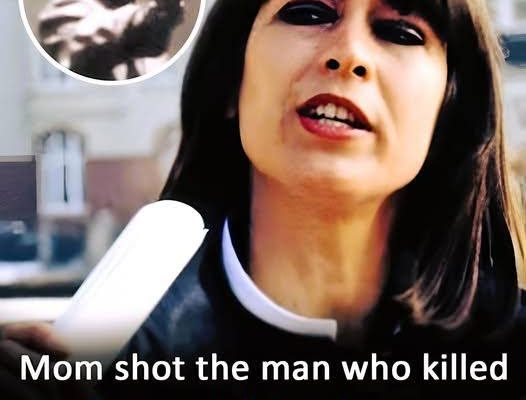On March 6, 1981, Marianne Bachmeier entered a courtroom in Lübeck, Germany, with determination evident in her every step. In a shocking turn of events, she pulled a loaded pistol from her handbag and opened fire on Klaus Grabowski, a 35-year-old sex offender. Grabowski had been charged with the kidnapping, sexual abuse, and murder of Marianne’s 7-year-old daughter, Anna Bachmeier. Within moments, he succumbed to his injuries, struck by seven bullets fired by Marianne, and collapsed on the courtroom floor. The grieving mother was promptly taken into custody, displaying no signs of remorse. Four decades later, the figure of the “revenge mom” remains etched in public memory, and her sentencing continues to polarize the nation.
The loss of a child is often regarded as the most profound tragedy a parent can face. Marianne Bachmeier’s life was irrevocably altered on May 5, 1980. During the 1980s, she was a struggling single mother managing a pub in Lübeck, northern Germany. Her own childhood was fraught with hardship and trauma; her father had been affiliated with the Waffen-SS, a notorious group from Nazi Germany. Throughout her youth, Marianne endured multiple instances of sexual assault. At the age of 16, she became pregnant but, unable to care for the child, chose to place the baby for adoption. When she turned 18, she found herself pregnant again and similarly relinquished that child to an adoption agency.
In 1973, Marianne welcomed her third child, Anna, whom she raised alone as a single mother. Reports describe Anna as a “happy, open-minded child,” yet tragedy was soon to strike the family. In May 1980, following a disagreement with her mother, Anna decided to skip school and visit a friend. Tragically, during her journey, she was abducted by Klaus Grabowski, a local butcher aged 35.
Grabowski held Anna captive in his apartment for several hours, subjecting the young girl to abuse before ultimately strangling her to death. After committing the murder, he concealed her body in a box, which he then hid near the bank of a canal. Later, Grabowski returned to the site to bury Anna’s remains but was apprehended that same evening at his regular pub in Lübeck, following his fiancé’s decision to report him to the authorities.
At the time of the incident, Grabowski was already a registered sex offender, having previously served time for sexually assaulting two young girls. While incarcerated in 1976, he underwent voluntary castration. Two years later, he began hormone therapy to reverse the effects of the chemical castration, hoping to pursue a romantic relationship with his fiancé.
Grabowski quickly confessed to murdering Anna but denied any sexual abuse. During his trial, he went so far as to assert that Anna had attempted to seduce and extort him. He shifted the blame onto his victim, claiming that he killed her because she threatened to blackmail him, alleging that she demanded money or she would inform her mother about his inappropriate actions.
The court dismissed Grabowski’s defense. His bizarre and unsettling narrative drove Anna’s mother, Marianne, to a state of despair, anger, and helplessness. On March 6, 1981, the third day of the trial, Marianne resolved to take action herself.
Somehow, she managed to smuggle a firearm into the courtroom, evading security measures and guards. Once inside, she drew the loaded gun from her handbag, aimed it at her daughter’s murderer, and fired all the rounds. Seven out of eight bullets struck their target, and Grabowski collapsed instantly, dying on the spot. Following the shooting, Anna’s mother dropped the Beretta M1934 and her voice resonated throughout the courtroom.
He took my daughter’s life… I wanted to shoot him in the face, but instead, I shot him in the back… I hope he is dead.
Two police officers present at the scene reported that Marianne referred to Grabowski as a “pig” after discharging her weapon. She was apprehended in the courtroom and initially charged with murder. During her 1982 trial, Marianne asserted that she shot Grabowski while in a dream-like state, having envisioned her daughter in the courtroom.
However, experts who testified during the trial indicated that Marianne’s actions demonstrated a level of proficiency with the firearm that suggested she had meticulously planned the shooting in advance.
Medical professionals also evaluated Marianne and requested a handwriting sample. In her response, she wrote: “I did it for you, Anna,” embellishing the note with seven hearts, which many interpreted as a tribute to each year of Anna’s life.
If found guilty, Marianne faced the prospect of life imprisonment. Her act of vigilantism garnered significant media attention, not only in Germany but globally. She was labeled “Revenge Mom,” and many believed she deserved acquittal during her trial.
The grieving mother, who sought retribution for her daughter’s tragic death, received widespread admiration and support, despite the nature of her actions. Initially, the media depicted Marianne as a saint; however, as journalists began to investigate her background, they uncovered that she had placed her first two children for adoption. Details about her frequent presence at the bar where she worked began to tarnish the image of a devoted and selfless mother.
In 1983, Marianne was convicted of premeditated manslaughter and illegal possession of a firearm, receiving a six-year prison sentence, though she was released after serving three years.
Her sentence sparked public debate, as indicated by a survey from the Allensbach Institute, which revealed that approximately 28 percent of respondents considered her six-year sentence to be appropriate.
After completing her prison sentence, Marianne relocated to Nigeria, where she married a German educator. In 1990, she divorced and subsequently moved to Sicily, Italy. Tragically, Marianne was later diagnosed with pancreatic cancer, prompting her return to her homeland and hometown of Lübeck.
Her act of vengeance remained etched in the memories of many Germans, with newspapers continuing to report on the incident well into the 1990s. In 1994, thirteen years after her actions, she participated in a rare interview on German radio.
“I believe there is a significant distinction when I take the life of a young girl out of fear of facing a life sentence. Additionally, the manner in which I do it matters; for instance, standing behind the girl and strangling her, as he described: ‘I heard something come from her nose, I was transfixed, and then I could no longer bear to look at her body,’” she recounted.
In a 1995 interview with the Das Erste TV channel, Marianne admitted that she had shot Grabowski after careful deliberation to prevent him from disseminating further falsehoods about Anna.
On September 17, 1996, Marianne passed away in a Lübeck hospital. She had wished to die in her former home in Sicily but was unable to fulfill that desire. Marianne was later interred beside her cherished daughter in a cemetery in Lübeck.









